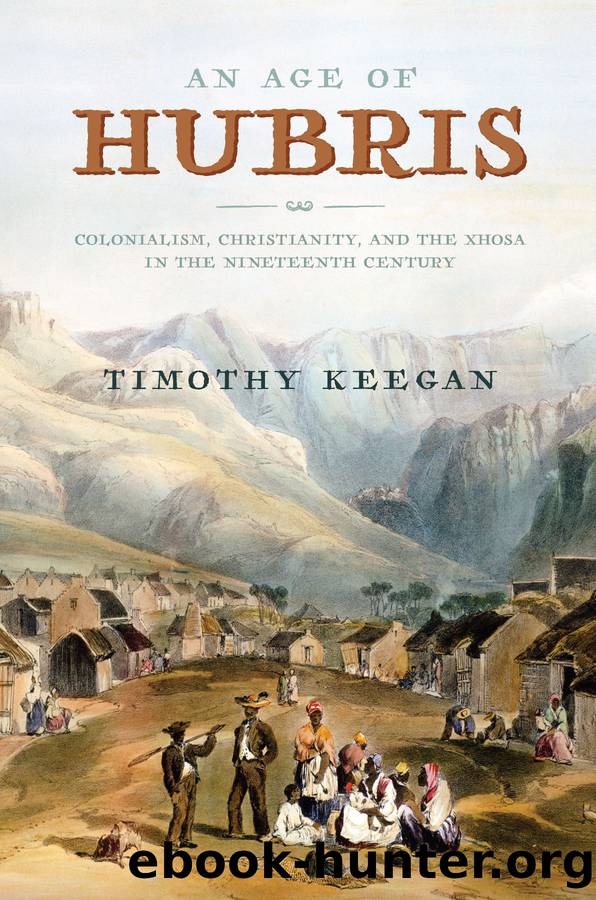An Age of Hubris by Timothy Keegan;

Author:Timothy Keegan;
Language: eng
Format: epub
Publisher: Lightning Source Inc. (Tier 3)
7
Moralizing Africa
IN MISSIONARY theory, conversion could only truly be effected through cultural and cognitive transformations at the deepest subjective level of the sovereign self. If colonial science of a later date sought to objectify Africans, describing, categorizing, and collectivizing them, the early missionaries set about imbuing them with a sense of themselves as self-aware individuals, remade in a bourgeois image. Revealing to them the universal truths of Christianity meant freeing them from the matrix of superstition in which they dwelled, for Christian truths in the Protestant tradition were truths that had to be internalized and embraced by the free agent, persuaded of the power of his or her own conscious agency.
This construct of the reborn Christian individual bore little relationship to how human beings actually operate in society. Far from being the end point in human spiritual evolution, the ideal that missionaries held out as the way civilized man should be in the world was likely to strike Africans as incomprehensible, unnatural, and alien. Whatever their intentions, missionaries were bound to find that colonizing peopleâs consciousness was easier to envision than to accomplish. Indeed, such colonization was likely to work both ways. Influences made themselves felt back and forth across conceptual boundaries. In subtle ways, missionaries were likely to be drawn into African ways of seeing, just as Africans drew on European technologies, practices, and signs in ways that Europeans could not have foreseen or understood. As a function of living among African peoples, these Europeans were bound to adapt to local construction methods, foodstuffs, household management, child-rearing, healing technologies, farming methods, animal husbandry. As language learners, missionaries were not just meaning makers but imbibers of othersâ knowledge and meanings, subject to direction, condescension, and ridicule from those they had come to teach. Rachael Gilmour suggests that âthe destabilizing possibilities of self-doubt, acculturation, pollution and role-reversal are all raised in missionary accounts of their own and othersâ language learning.â Indeed, it is likely that missionariesâ religious views and beliefs were materially influenced by their interactions with Africans, whose perspectives on the basic principles of Christian doctrine required them to explain notions they had never had to explain before.1
In their public writings, missionaries never doubted that all cultural power was in their hands, that traffic was all one way, that their often prurient curiosity about Africans served only to facilitate more effectively their subjectsâ metamorphosis into creatures of the Christian God. But European influence was always partial and selective, despite the symbolic forms in which the missionaries dressed up their triumphs. Persuading converts to renounce Xhosa names and adopt the surnames of church worthies in Britain was one obvious surface manifestation of transformed subjectivities. But it remained a surface manifestation and was eventually largely abandoned as a result of African resistance to the practice.
Gender was at the heart of much of what occupied the missionariesâ imaginations. A constant trope among them was the exploitation of women, the practice of âbuying and sellingâ wives, which allegedly reduced women to the status of slaves.
Download
This site does not store any files on its server. We only index and link to content provided by other sites. Please contact the content providers to delete copyright contents if any and email us, we'll remove relevant links or contents immediately.
| General | Copenhagen |
Room 212 by Kate Stewart(4121)
The Crown by Robert Lacey(4121)
Endurance: Shackleton's Incredible Voyage by Alfred Lansing(3857)
The Iron Duke by The Iron Duke(3657)
The Rape of Nanking by Iris Chang(3531)
Killing England by Bill O'Reilly(3467)
Joan of Arc by Mary Gordon(3272)
Say Nothing by Patrick Radden Keefe(3077)
I'll Give You the Sun by Jandy Nelson(2849)
Shadow of Night by Deborah Harkness(2747)
Hitler's Monsters by Eric Kurlander(2741)
Margaret Thatcher: The Autobiography by Thatcher Margaret(2691)
Mary, Queen of Scots, and the Murder of Lord Darnley by Alison Weir(2683)
Darkest Hour by Anthony McCarten(2655)
Blood and Sand by Alex Von Tunzelmann(2615)
Red Famine: Stalin's War on Ukraine by Anne Applebaum(2472)
Eleanor & Park by Rainbow Rowell(2402)
The One Memory of Flora Banks by Emily Barr(2357)
Book of Life by Deborah Harkness(2286)
